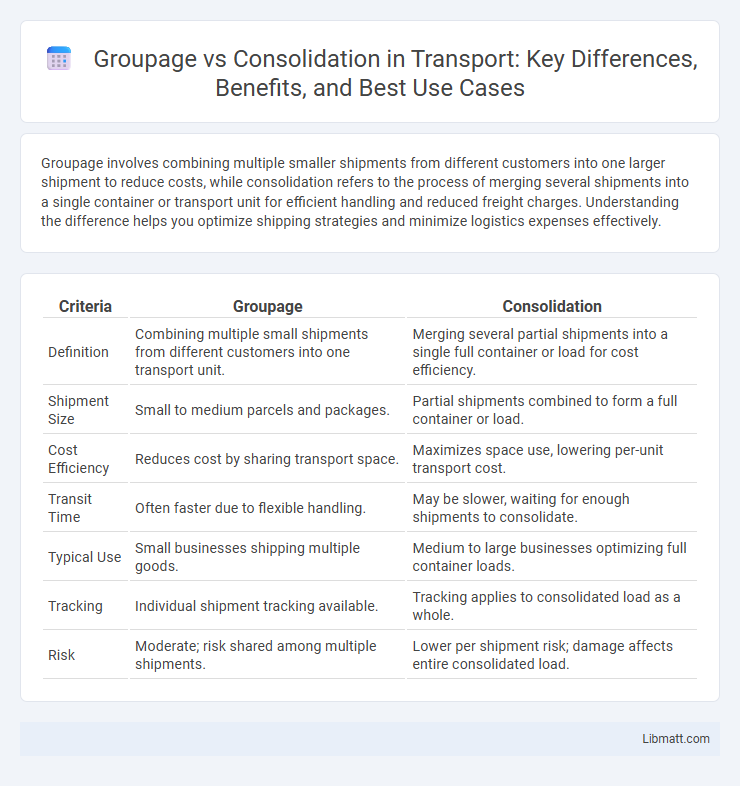Groupage involves combining multiple smaller shipments from different customers into one larger shipment to reduce costs, while consolidation refers to the process of merging several shipments into a single container or transport unit for efficient handling and reduced freight charges. Understanding the difference helps you optimize shipping strategies and minimize logistics expenses effectively.
Table of Comparison
| Criteria | Groupage | Consolidation |
|---|---|---|
| Definition | Combining multiple small shipments from different customers into one transport unit. | Merging several partial shipments into a single full container or load for cost efficiency. |
| Shipment Size | Small to medium parcels and packages. | Partial shipments combined to form a full container or load. |
| Cost Efficiency | Reduces cost by sharing transport space. | Maximizes space use, lowering per-unit transport cost. |
| Transit Time | Often faster due to flexible handling. | May be slower, waiting for enough shipments to consolidate. |
| Typical Use | Small businesses shipping multiple goods. | Medium to large businesses optimizing full container loads. |
| Tracking | Individual shipment tracking available. | Tracking applies to consolidated load as a whole. |
| Risk | Moderate; risk shared among multiple shipments. | Lower per shipment risk; damage affects entire consolidated load. |
Understanding Groupage: A Comprehensive Overview
Groupage refers to the process of combining multiple smaller shipments from different suppliers into one container to optimize shipping costs and improve efficiency. This method is ideal for businesses with less-than-container load (LCL) shipments, allowing you to benefit from reduced freight charges and shared logistics resources. Understanding groupage enables better planning and cost management for your international shipping needs.
What is Consolidation Shipping?
Consolidation shipping involves combining multiple smaller shipments from different suppliers into a single, larger shipment to optimize transportation costs and improve efficiency. This method reduces per-unit shipping expenses by pooling cargo destined for the same location, benefiting businesses with smaller freight quantities. Unlike groupage, which also combines shipments but often with less integration and planning, consolidation ensures a more streamlined logistics process with consolidated documentation and coordinated delivery schedules.
Key Differences Between Groupage and Consolidation
Groupage involves combining smaller shipments from multiple shippers into one container to reduce costs and improve shipping efficiency, while consolidation merges several shipments from the same shipper or related parties into a single shipment. Key differences include shipment origin--groupage serves diverse customers, whereas consolidation typically serves one shipper--and billing, as groupage charges each party individually, but consolidation often bills one party for the entire shipment. Your choice between groupage and consolidation depends on shipment size, frequency, and cost-effectiveness.
Benefits of Groupage in Freight Shipping
Groupage in freight shipping offers cost efficiency by combining multiple small shipments from different exporters into a single container, reducing overall shipping expenses. This method enhances flexibility and frequency of shipments, allowing your cargo to move faster without waiting for full container loads. Groupage also minimizes risk through shared responsibility among shippers, ensuring safer and more reliable delivery.
Advantages of Cargo Consolidation Services
Cargo consolidation services combine multiple smaller shipments into a single container, significantly reducing transportation costs and minimizing the risk of damage during transit. This method optimizes container space, making your shipping more efficient and environmentally friendly by lowering carbon emissions. You benefit from simplified logistics, as fewer shipments mean less paperwork and streamlined customs clearance.
Cost Comparison: Groupage vs Consolidation
Groupage shipments typically offer lower costs by sharing container space among multiple exporters, making it ideal for smaller cargo that doesn't fill a full container. Consolidation combines multiple shipments from various clients into one full container load, often reducing per-unit transport expenses for larger volumes but may involve higher handling fees. Your choice depends on shipment size and budget, balancing the cost efficiency of shared space in groupage against the economies of scale provided by consolidation.
Transit Times: Which Is Faster, Groupage or Consolidation?
Groupage shipments typically offer faster transit times due to quicker loading and unloading processes, as cargo is divided among multiple smaller consignments. Consolidation involves combining larger shipments, which can result in longer waiting periods to fill containers before dispatch. Therefore, for urgent deliveries, groupage is generally the preferred choice over consolidation in terms of speed.
Choosing the Right Solution: Factors to Consider
Selecting between groupage and consolidation depends on shipment size, cost efficiency, and delivery timelines. Groupage suits smaller shipments by combining multiple consignments from different clients, reducing costs without waiting for full container loads. Consolidation is ideal for larger volumes requiring full container space, offering better control over transit time and security.
Best Practices for Efficient Groupage and Consolidation
Efficient groupage and consolidation require precise shipment planning, accurate cargo documentation, and strategic selection of compatible goods to maximize container space utilization. Implementing real-time tracking systems and collaborating closely with reliable carriers and freight forwarders reduces delays and ensures smooth cargo handling. Regular performance evaluations and adopting advanced logistics technologies optimize supply chain coordination and cost-effectiveness.
Future Trends in Groupage and Consolidation Logistics
Future trends in groupage and consolidation logistics emphasize increased automation and digitalization to enhance efficiency and reduce transit times. The adoption of AI-driven route optimization and blockchain for transparent tracking is transforming cargo management and boosting supply chain visibility. Growing environmental regulations are driving the shift towards eco-friendly consolidation hubs and greener transport modes in groupage operations.
groupage vs consolidation Infographic

 libmatt.com
libmatt.com